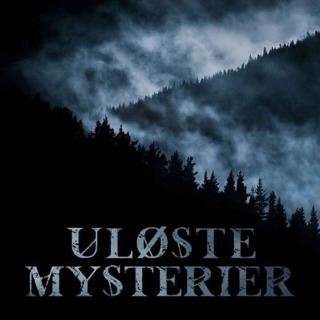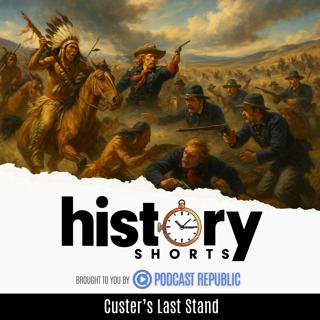
Custer's Last Stand
In the summer of 1876, as America celebrated its centennial, a stunning defeat unfolded on the plains of Montana. Lt. Colonel George Custer and over 200 soldiers of the 7th Cavalry were wiped out by a united force of Lakota Sioux, Northern Cheyenne, and Arapaho warriors. Known popularly as Custer’s Last Stand, the Battle of Little Bighorn became one of the most mythologized and misunderstood clashes in American history. In this episode, we revisit the true story of Little Bighorn: the broken treaties, the clash of cultures, Custer’s fatal miscalculations, and the tactical brilliance of Native leaders like Crazy Horse and Gall. What really happened in those fateful hills, and how did a moment of Indigenous triumph become buried beneath legend? Topics Covered: The discovery of gold in the Black Hills and the violation of the Fort Laramie Treaty The U.S. military’s three-pronged campaign to subdue the “hostile” tribes George Custer’s ego, decisions, and leadership flaws The strength, unity, and strategy of the Native coalition The events of June 25, 1876, what happened, and what went wrong The immediate U.S. response and the long-term consequences for Native nations How Custer became a myth, and how that myth distorted history Modern interpretations and memorials from both sides DON’T FORGET TO SUBSCRIBE AND LEAVE A RATING OR A REVIEW! THANK YOU IN ADVANCE! SPONSORED BY THE PODCAST REPUBLIC: https://www.podcastrepublic.net/ LEARN MORE AT: www.historyshortspodcast.com SUPPORT THE SHOW: https://www.patreon.com/c/HistoryShortsPodcast ADVERTISE: https://www.historyshortspodcast.com/advertise SUPPORT THE SHOW: https://www.patreon.com/c/HistoryShortsPodcast LEARN MORE: https://www.historyshortspodcast.com/
29 Jun 9min
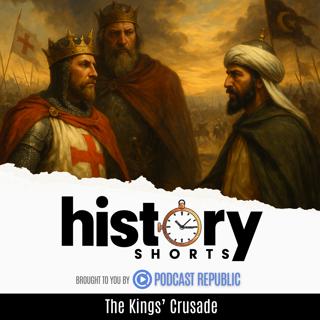
The Kings' Crusade
In the wake of Jerusalem’s fall to Saladin in 1187, three of Europe’s mightiest monarchs, Richard the Lionheart of England, Philip Augustus of France, and Frederick Barbarossa of the Holy Roman Empire, launched an extraordinary military expedition to reclaim Christendom’s most sacred city. The Third Crusade, remembered as The Kings’ Crusade, was a clash of titans, driven by religious fervor, political ambition, and personal rivalry. In this episode, we retrace the dramatic course of this crusade, from Barbarossa’s tragic drowning to Richard’s dazzling victories, and from the brutal Siege of Acre to the surprisingly respectful diplomacy between Richard and Saladin. Though Jerusalem would remain in Muslim hands, the crusade reshaped the medieval world and forged legends that endure to this day. Topics Covered: The fall of Jerusalem and the call for the Third Crusade The ambitions and rivalries of Europe’s three most powerful kings The death of Frederick Barbarossa and the collapse of the German forces. Richard the Lionheart’s conquests in Cyprus and the Holy Land The Siege of Acre and the mass execution of prisoners The legendary Battle of Arsuf and Richard’s military brilliance Richard and Saladin’s negotiations and mutual respect The Treaty of Jaffa and the legacy of the Third Crusade DON’T FORGET TO SUBSCRIBE AND LEAVE A RATING OR A REVIEW! THANK YOU IN ADVANCE! SPONSORED BY THE PODCAST REPUBLIC: https://www.podcastrepublic.net/ LEARN MORE AT: www.historyshortspodcast.com SUPPORT THE SHOW: https://www.patreon.com/c/HistoryShortsPodcast ADVERTISE: https://www.historyshortspodcast.com/advertise SUPPORT THE SHOW: https://www.patreon.com/c/HistoryShortsPodcast LEARN MORE: https://www.historyshortspodcast.com/
28 Jun 11min
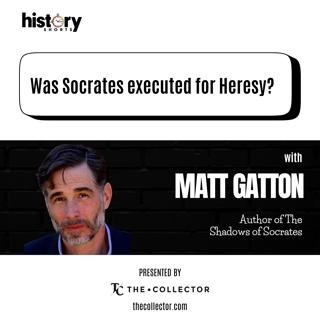
Conversations: The Mystery Behind Socrates' Death w/ Matt Gatton
Peter speaks with Matt Gatton about his newest book, The Shadows of Socrates, which reframes Socrates not merely as a martyr for free speech but as a philosophical heretic, whose intellectual rebellion against the dominant spiritual order ultimately sealed his fate. SUBSCRIBE, LEAVE A REVIEW, OR A RATING! LEARN MORE: www.historyshortspodcast.com SUPPORT THE SHOW: https://www.patreon.com/c/HistoryShortsPodcast BUY MATT'S BOOK EPISODE SPONSOR: https://www.thecollector.com/ This Week's Peter's Top Picks from The Collector: Why is Socrates' Death Still Discussed? How did Socrates Die?
27 Jun 30min
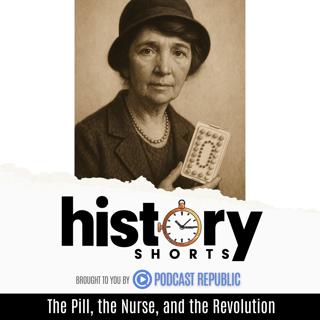
The Pill, the Nurse, and the Revolution
Few medical breakthroughs have changed the world as profoundly as the birth control pill, and few people were as instrumental in that transformation as Margaret Sanger. In this episode, we trace the fierce, controversial, and ultimately world-shaking campaign for reproductive autonomy, from back-alley clinics and prison cells to laboratories and FDA approval. Margaret and the Pill is not just the story of a scientific invention, it’s a story of defiance, moral courage, strategic compromise, and the complicated legacy of one woman whose vision reshaped the 20th century. Topics Covered: Margaret Sanger’s early life and motivation for fighting for birth control The Comstock Laws and the criminalization of contraceptive information Founding of the first birth control clinic and Planned Parenthood Sanger’s controversial ties to eugenics Collaboration with Gregory Pincus and Katharine McCormick Development, trials, and approval of the birth control pill The sexual revolution and the pill’s far-reaching cultural impact The backlash, religious opposition, and feminist critiques Sanger’s legacy: groundbreaking pioneer or flawed radical? DON’T FORGET TO SUBSCRIBE AND LEAVE A RATING OR A REVIEW! THANK YOU IN ADVANCE! SPONSORED BY THE PODCAST REPUBLIC: https://www.podcastrepublic.net/ LEARN MORE AT: www.historyshortspodcast.com SUPPORT THE SHOW: https://www.patreon.com/c/HistoryShortsPodcast ADVERTISE: https://www.historyshortspodcast.com/advertise SUPPORT THE SHOW: https://www.patreon.com/c/HistoryShortsPodcast LEARN MORE: https://www.historyshortspodcast.com/
26 Jun 10min
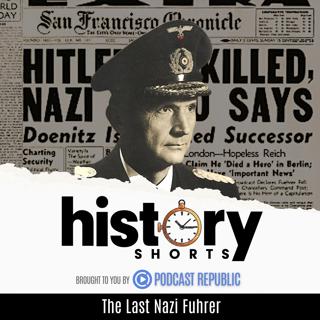
The Last Nazi Fuhrer
When Adolf Hitler shot himself in a Berlin bunker, the Nazi regime didn’t die with him, not immediately. In an eerie coda to World War II, Grand Admiral Karl Dönitz, commander of Germany’s deadly U-boat fleet, was named Hitler’s successor. For three surreal weeks, Dönitz led the so-called Flensburg Government, navigating the ruins of a dead empire, issuing decrees, and negotiating surrender. This episode explores how a naval officer became the last Führer of Nazi Germany, why he was chosen, what his government tried to accomplish, and how he escaped the noose at Nuremberg despite his deep loyalty to Hitler and the Nazi cause. Topics Covered: Dönitz’s rise through the Kriegsmarine and U-boat warfare Why Hitler chose Dönitz over Himmler or Goebbels The eerie formation and function of the Flensburg Government Dönitz’s strategy to surrender to the West while stalling the Soviets His arrest, trial at Nuremberg, and controversial prison sentence Postwar mythmaking and Dönitz’s self-portrayal as a “loyal soldier” The shadowy legacy of a man who ruled Nazi Germany after Hitler DON’T FORGET TO SUBSCRIBE AND LEAVE A RATING OR A REVIEW! THANK YOU IN ADVANCE! SPONSORED BY THE PODCAST REPUBLIC: https://www.podcastrepublic.net/ LEARN MORE AT: www.historyshortspodcast.com SUPPORT THE SHOW: https://www.patreon.com/c/HistoryShortsPodcast ADVERTISE: https://www.historyshortspodcast.com/advertise SUPPORT THE SHOW: https://www.patreon.com/c/HistoryShortsPodcast LEARN MORE: https://www.historyshortspodcast.com/
25 Jun 10min
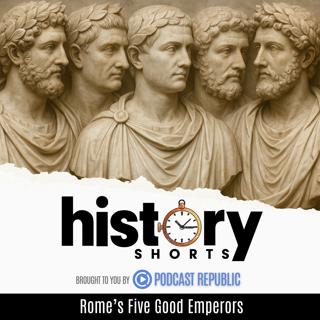
Rome's Five Good Emperors
For 84 remarkable years, from 96 to 180 CE, the Roman Empire was guided not by the worst instincts of autocracy, but by its best hopes. In this episode, we explore the era of The Five Good Emperors: Nerva, Trajan, Hadrian, Antoninus Pius, and Marcus Aurelius. Chosen not by birthright but by merit, these rulers led Rome through a golden age of relative peace, prosperity, and principled governance. We’ll trace their legacies, military conquests, architectural marvels, legal reforms, philosophical meditations, and ask why, in a brutal age of emperors-gone-mad, these five men stood apart. And why the dream of wise succession died with Marcus Aurelius. Topics Covered: The fall of Domitian and the birth of a new political principle: adoption over bloodline Trajan’s military genius and public generosity Hadrian’s architectural vision and philosophical eccentricity Antoninus Pius’ peaceful stewardship and reforms Marcus Aurelius’ stoic leadership during the plague and war Why this golden era ended—and what modern leadership can learn from it DON’T FORGET TO SUBSCRIBE AND LEAVE A RATING OR A REVIEW! THANK YOU IN ADVANCE! SPONSORED BY THE PODCAST REPUBLIC: https://www.podcastrepublic.net/ LEARN MORE AT: www.historyshortspodcast.com SUPPORT THE SHOW: https://www.patreon.com/c/HistoryShortsPodcast ADVERTISE: https://www.historyshortspodcast.com/advertise SUPPORT THE SHOW: https://www.patreon.com/c/HistoryShortsPodcast LEARN MORE: https://www.historyshortspodcast.com/
24 Jun 11min

The "Other" Rosa Parks
Before Rosa Parks made history by refusing to give up her seat in Montgomery, Alabama, there was another young woman, just 15 years old, who had done the very same thing. Her name was Claudette Colvin. In this episode, we uncover the overlooked and extraordinary story of Colvin’s defiance, arrest, and her pivotal role in the court case that would ultimately help bring down bus segregation in the South. Why was her name nearly erased from the movement? What does her story reveal about the politics of protest and the cost of courage? Join us as we explore how a teenager with fire in her heart and history in her classroom helped lay the legal foundation for one of the most powerful civil rights victories in American history. Topics Covered: The climate of Montgomery, Alabama, in early 1955 Claudette Colvin’s act of defiance and arrest Why the civil rights leadership chose Rosa Parks instead The role of respectability politics in the movement Colvin’s role in Browder v. Gayle and desegregating buses Her life after the movement and slow path to recognition The legacy of young, often-forgotten pioneers in social change DON’T FORGET TO SUBSCRIBE AND LEAVE A RATING OR A REVIEW! THANK YOU IN ADVANCE! SPONSORED BY THE PODCAST REPUBLIC: https://www.podcastrepublic.net/ LEARN MORE AT: www.historyshortspodcast.com SUPPORT THE SHOW: https://www.patreon.com/c/HistoryShortsPodcast ADVERTISE: https://www.historyshortspodcast.com/advertise SUPPORT THE SHOW: https://www.patreon.com/c/HistoryShortsPodcast LEARN MORE: https://www.historyshortspodcast.com/
23 Jun 9min
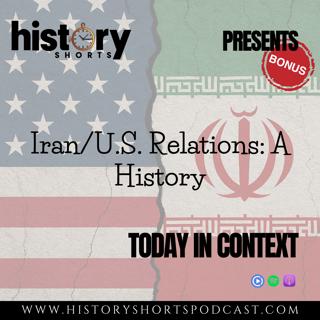
Today in Context: Iran/U.S Relations: A History
TODAY IN CONTEXT BONUS: The animosity between the United States and Iran is one of the most enduring geopolitical rivalries in modern history, rooted in a mix of historical grievances, ideological conflicts, and strategic competition. In this episode, we explore how this complex relationship evolved from the early 20th century to the present day. The 1953 CIA-led coup that overthrew Iran’s democratic government, the 1979 Iranian Revolution, the Iran Hostage Crisis, the nuclear standoff, and the rise of regional tensions have all contributed to the bitter rift between the two nations. With each new chapter of this rivalry, the animosity deepens, leaving a legacy that continues to shape global politics today. DON’T FORGET TO SUBSCRIBE AND LEAVE A RATING OR A REVIEW! THANK YOU IN ADVANCE! SPONSORED BY THE PODCAST REPUBLIC: https://www.podcastrepublic.net/ LEARN MORE AT: www.historyshortspodcast.com SUPPORT THE SHOW: https://www.patreon.com/c/HistoryShortsPodcast ADVERTISE: https://www.historyshortspodcast.com/advertise SUPPORT THE SHOW: https://www.patreon.com/c/HistoryShortsPodcast LEARN MORE: https://www.historyshortspodcast.com/
22 Jun 13min
















